International Human Resource Management: Appraisal of Expatriate Managers, Training Challenges, Compensation Practices, Bribery Criminalization, and HRM Challenges in SMEs
VerifiedAdded on 2023/06/06
|13
|3178
|422
AI Summary
This article discusses the major factors associated with appraisal of expatriate managerial performance, key challenges in training expatriate managers, importance of compensation practices of other countries for MNEs, personal views of international initiatives to criminalize foreign bribery, and typical challenges for HRM in internationalized SMEs. It also highlights the emerging trends in global mobility programs, compensation benefits, and the need for ethical practices in HRM.
Contribute Materials
Your contribution can guide someone’s learning journey. Share your
documents today.
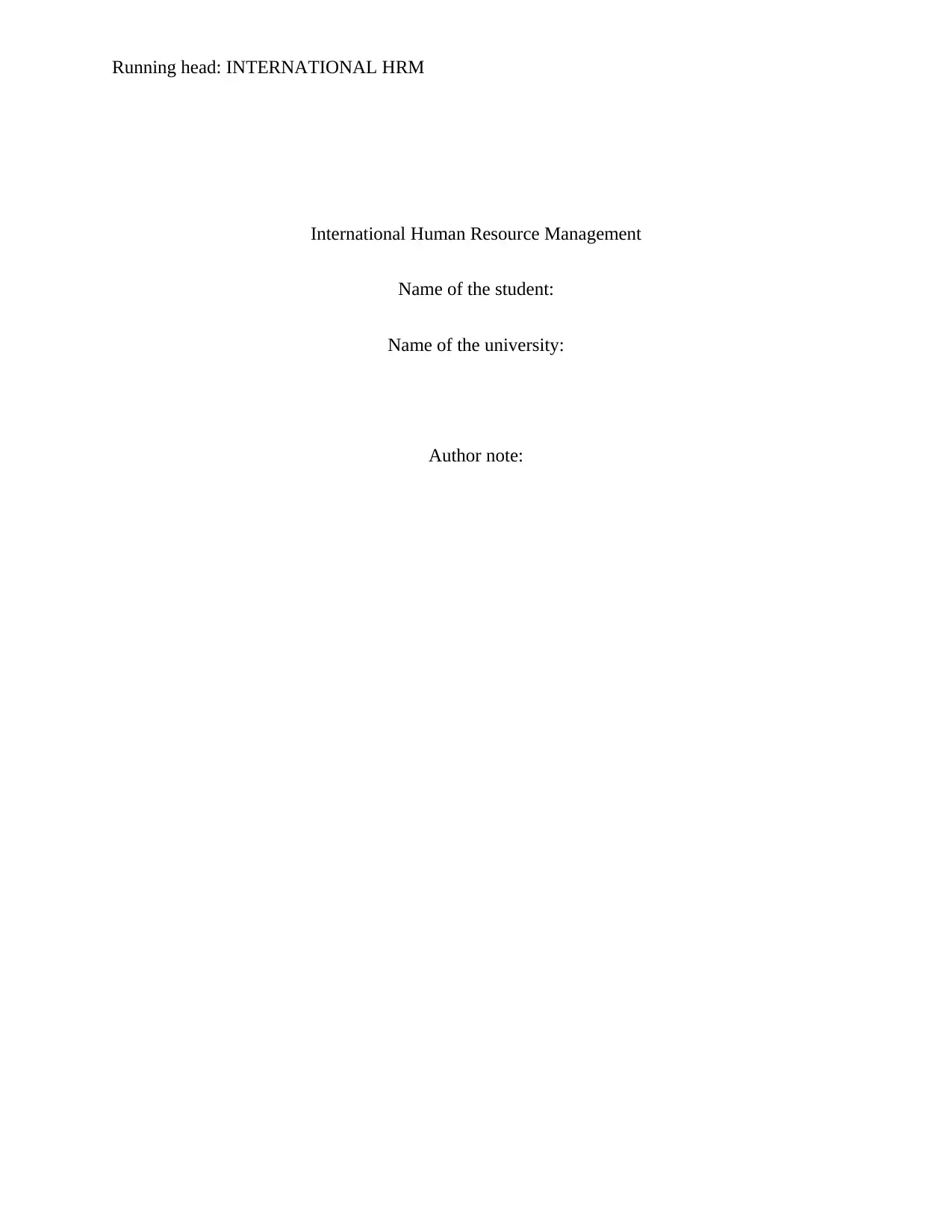
Running head: INTERNATIONAL HRM
International Human Resource Management
Name of the student:
Name of the university:
Author note:
International Human Resource Management
Name of the student:
Name of the university:
Author note:
Secure Best Marks with AI Grader
Need help grading? Try our AI Grader for instant feedback on your assignments.
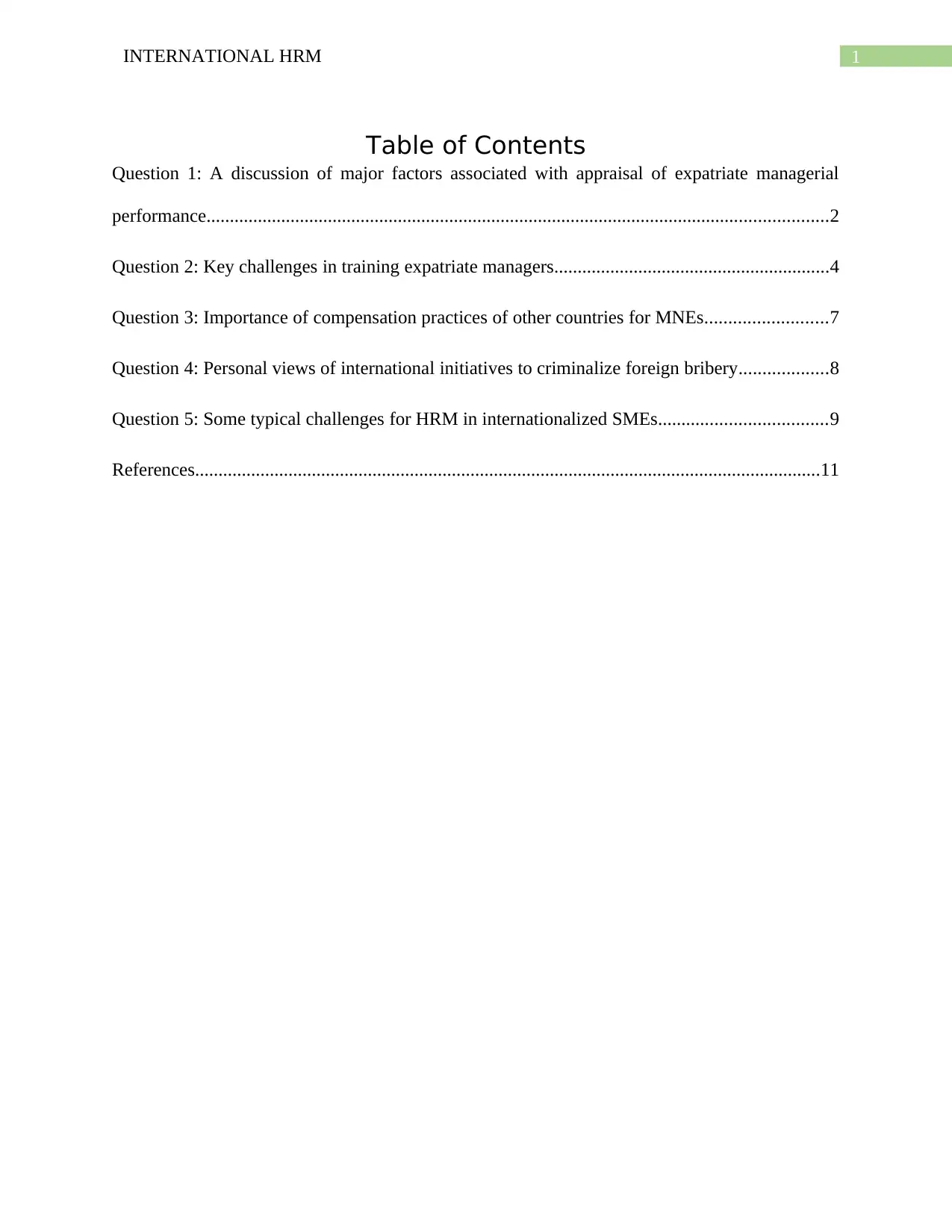
1INTERNATIONAL HRM
Table of Contents
Question 1: A discussion of major factors associated with appraisal of expatriate managerial
performance.....................................................................................................................................2
Question 2: Key challenges in training expatriate managers...........................................................4
Question 3: Importance of compensation practices of other countries for MNEs..........................7
Question 4: Personal views of international initiatives to criminalize foreign bribery...................8
Question 5: Some typical challenges for HRM in internationalized SMEs....................................9
References......................................................................................................................................11
Table of Contents
Question 1: A discussion of major factors associated with appraisal of expatriate managerial
performance.....................................................................................................................................2
Question 2: Key challenges in training expatriate managers...........................................................4
Question 3: Importance of compensation practices of other countries for MNEs..........................7
Question 4: Personal views of international initiatives to criminalize foreign bribery...................8
Question 5: Some typical challenges for HRM in internationalized SMEs....................................9
References......................................................................................................................................11
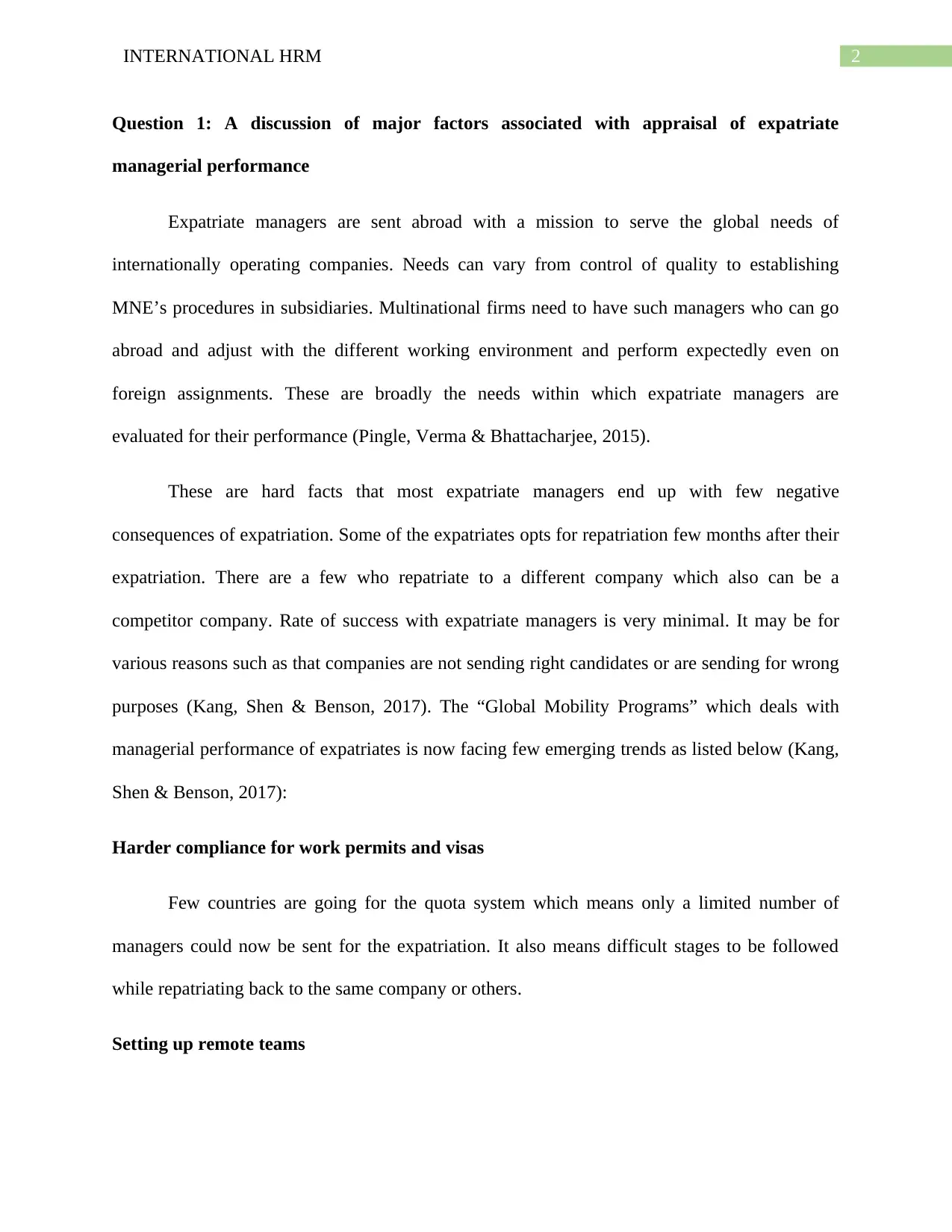
2INTERNATIONAL HRM
Question 1: A discussion of major factors associated with appraisal of expatriate
managerial performance
Expatriate managers are sent abroad with a mission to serve the global needs of
internationally operating companies. Needs can vary from control of quality to establishing
MNE’s procedures in subsidiaries. Multinational firms need to have such managers who can go
abroad and adjust with the different working environment and perform expectedly even on
foreign assignments. These are broadly the needs within which expatriate managers are
evaluated for their performance (Pingle, Verma & Bhattacharjee, 2015).
These are hard facts that most expatriate managers end up with few negative
consequences of expatriation. Some of the expatriates opts for repatriation few months after their
expatriation. There are a few who repatriate to a different company which also can be a
competitor company. Rate of success with expatriate managers is very minimal. It may be for
various reasons such as that companies are not sending right candidates or are sending for wrong
purposes (Kang, Shen & Benson, 2017). The “Global Mobility Programs” which deals with
managerial performance of expatriates is now facing few emerging trends as listed below (Kang,
Shen & Benson, 2017):
Harder compliance for work permits and visas
Few countries are going for the quota system which means only a limited number of
managers could now be sent for the expatriation. It also means difficult stages to be followed
while repatriating back to the same company or others.
Setting up remote teams
Question 1: A discussion of major factors associated with appraisal of expatriate
managerial performance
Expatriate managers are sent abroad with a mission to serve the global needs of
internationally operating companies. Needs can vary from control of quality to establishing
MNE’s procedures in subsidiaries. Multinational firms need to have such managers who can go
abroad and adjust with the different working environment and perform expectedly even on
foreign assignments. These are broadly the needs within which expatriate managers are
evaluated for their performance (Pingle, Verma & Bhattacharjee, 2015).
These are hard facts that most expatriate managers end up with few negative
consequences of expatriation. Some of the expatriates opts for repatriation few months after their
expatriation. There are a few who repatriate to a different company which also can be a
competitor company. Rate of success with expatriate managers is very minimal. It may be for
various reasons such as that companies are not sending right candidates or are sending for wrong
purposes (Kang, Shen & Benson, 2017). The “Global Mobility Programs” which deals with
managerial performance of expatriates is now facing few emerging trends as listed below (Kang,
Shen & Benson, 2017):
Harder compliance for work permits and visas
Few countries are going for the quota system which means only a limited number of
managers could now be sent for the expatriation. It also means difficult stages to be followed
while repatriating back to the same company or others.
Setting up remote teams
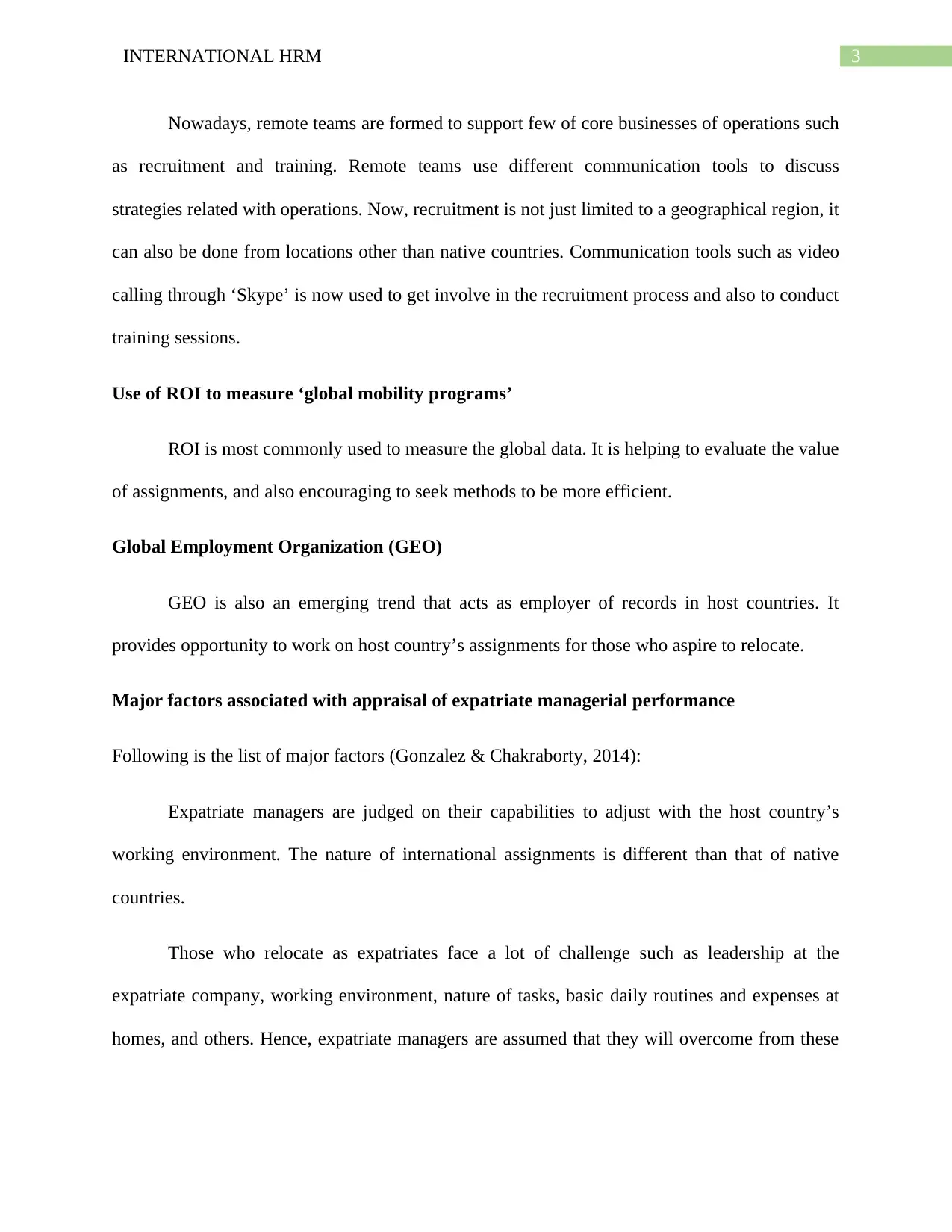
3INTERNATIONAL HRM
Nowadays, remote teams are formed to support few of core businesses of operations such
as recruitment and training. Remote teams use different communication tools to discuss
strategies related with operations. Now, recruitment is not just limited to a geographical region, it
can also be done from locations other than native countries. Communication tools such as video
calling through ‘Skype’ is now used to get involve in the recruitment process and also to conduct
training sessions.
Use of ROI to measure ‘global mobility programs’
ROI is most commonly used to measure the global data. It is helping to evaluate the value
of assignments, and also encouraging to seek methods to be more efficient.
Global Employment Organization (GEO)
GEO is also an emerging trend that acts as employer of records in host countries. It
provides opportunity to work on host country’s assignments for those who aspire to relocate.
Major factors associated with appraisal of expatriate managerial performance
Following is the list of major factors (Gonzalez & Chakraborty, 2014):
Expatriate managers are judged on their capabilities to adjust with the host country’s
working environment. The nature of international assignments is different than that of native
countries.
Those who relocate as expatriates face a lot of challenge such as leadership at the
expatriate company, working environment, nature of tasks, basic daily routines and expenses at
homes, and others. Hence, expatriate managers are assumed that they will overcome from these
Nowadays, remote teams are formed to support few of core businesses of operations such
as recruitment and training. Remote teams use different communication tools to discuss
strategies related with operations. Now, recruitment is not just limited to a geographical region, it
can also be done from locations other than native countries. Communication tools such as video
calling through ‘Skype’ is now used to get involve in the recruitment process and also to conduct
training sessions.
Use of ROI to measure ‘global mobility programs’
ROI is most commonly used to measure the global data. It is helping to evaluate the value
of assignments, and also encouraging to seek methods to be more efficient.
Global Employment Organization (GEO)
GEO is also an emerging trend that acts as employer of records in host countries. It
provides opportunity to work on host country’s assignments for those who aspire to relocate.
Major factors associated with appraisal of expatriate managerial performance
Following is the list of major factors (Gonzalez & Chakraborty, 2014):
Expatriate managers are judged on their capabilities to adjust with the host country’s
working environment. The nature of international assignments is different than that of native
countries.
Those who relocate as expatriates face a lot of challenge such as leadership at the
expatriate company, working environment, nature of tasks, basic daily routines and expenses at
homes, and others. Hence, expatriate managers are assumed that they will overcome from these
Secure Best Marks with AI Grader
Need help grading? Try our AI Grader for instant feedback on your assignments.
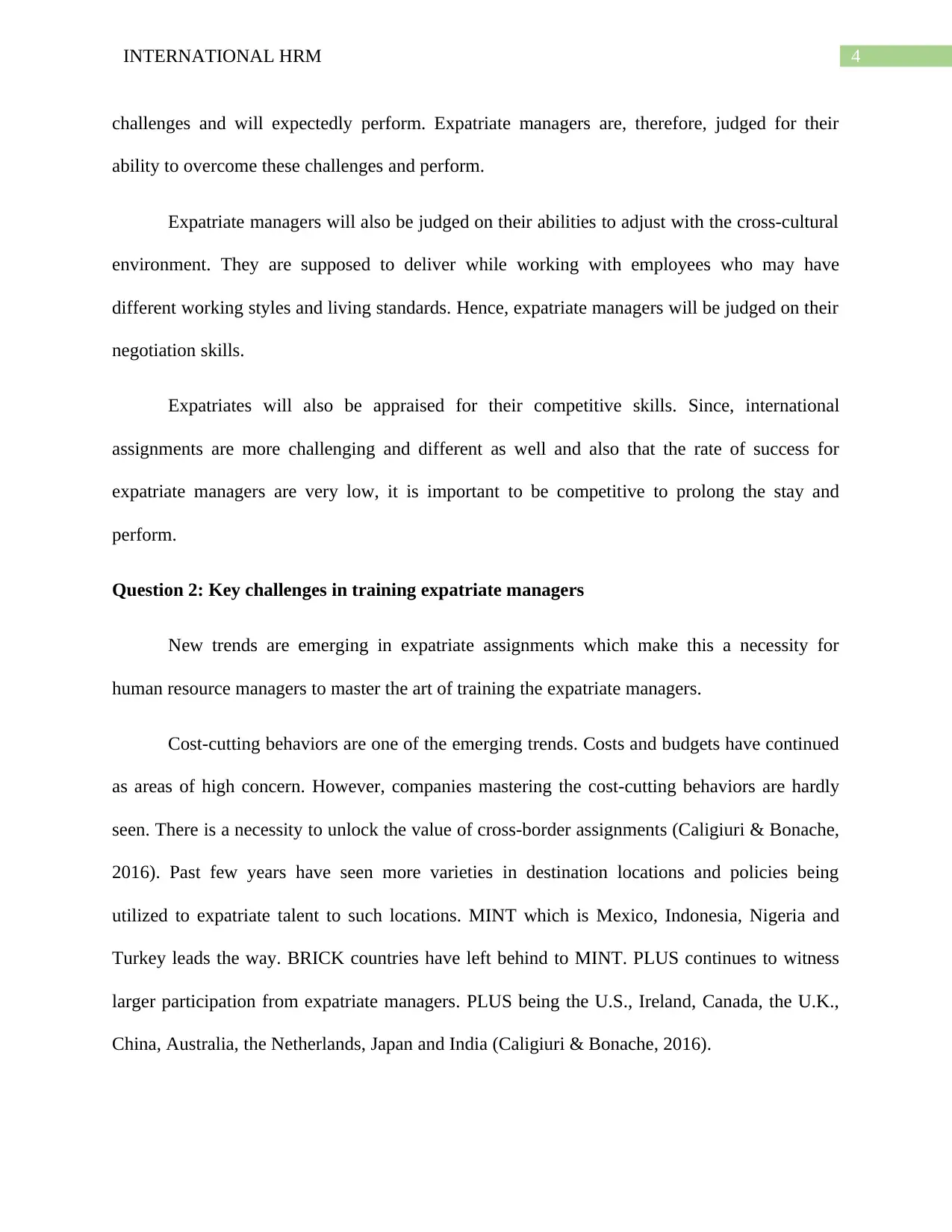
4INTERNATIONAL HRM
challenges and will expectedly perform. Expatriate managers are, therefore, judged for their
ability to overcome these challenges and perform.
Expatriate managers will also be judged on their abilities to adjust with the cross-cultural
environment. They are supposed to deliver while working with employees who may have
different working styles and living standards. Hence, expatriate managers will be judged on their
negotiation skills.
Expatriates will also be appraised for their competitive skills. Since, international
assignments are more challenging and different as well and also that the rate of success for
expatriate managers are very low, it is important to be competitive to prolong the stay and
perform.
Question 2: Key challenges in training expatriate managers
New trends are emerging in expatriate assignments which make this a necessity for
human resource managers to master the art of training the expatriate managers.
Cost-cutting behaviors are one of the emerging trends. Costs and budgets have continued
as areas of high concern. However, companies mastering the cost-cutting behaviors are hardly
seen. There is a necessity to unlock the value of cross-border assignments (Caligiuri & Bonache,
2016). Past few years have seen more varieties in destination locations and policies being
utilized to expatriate talent to such locations. MINT which is Mexico, Indonesia, Nigeria and
Turkey leads the way. BRICK countries have left behind to MINT. PLUS continues to witness
larger participation from expatriate managers. PLUS being the U.S., Ireland, Canada, the U.K.,
China, Australia, the Netherlands, Japan and India (Caligiuri & Bonache, 2016).
challenges and will expectedly perform. Expatriate managers are, therefore, judged for their
ability to overcome these challenges and perform.
Expatriate managers will also be judged on their abilities to adjust with the cross-cultural
environment. They are supposed to deliver while working with employees who may have
different working styles and living standards. Hence, expatriate managers will be judged on their
negotiation skills.
Expatriates will also be appraised for their competitive skills. Since, international
assignments are more challenging and different as well and also that the rate of success for
expatriate managers are very low, it is important to be competitive to prolong the stay and
perform.
Question 2: Key challenges in training expatriate managers
New trends are emerging in expatriate assignments which make this a necessity for
human resource managers to master the art of training the expatriate managers.
Cost-cutting behaviors are one of the emerging trends. Costs and budgets have continued
as areas of high concern. However, companies mastering the cost-cutting behaviors are hardly
seen. There is a necessity to unlock the value of cross-border assignments (Caligiuri & Bonache,
2016). Past few years have seen more varieties in destination locations and policies being
utilized to expatriate talent to such locations. MINT which is Mexico, Indonesia, Nigeria and
Turkey leads the way. BRICK countries have left behind to MINT. PLUS continues to witness
larger participation from expatriate managers. PLUS being the U.S., Ireland, Canada, the U.K.,
China, Australia, the Netherlands, Japan and India (Caligiuri & Bonache, 2016).
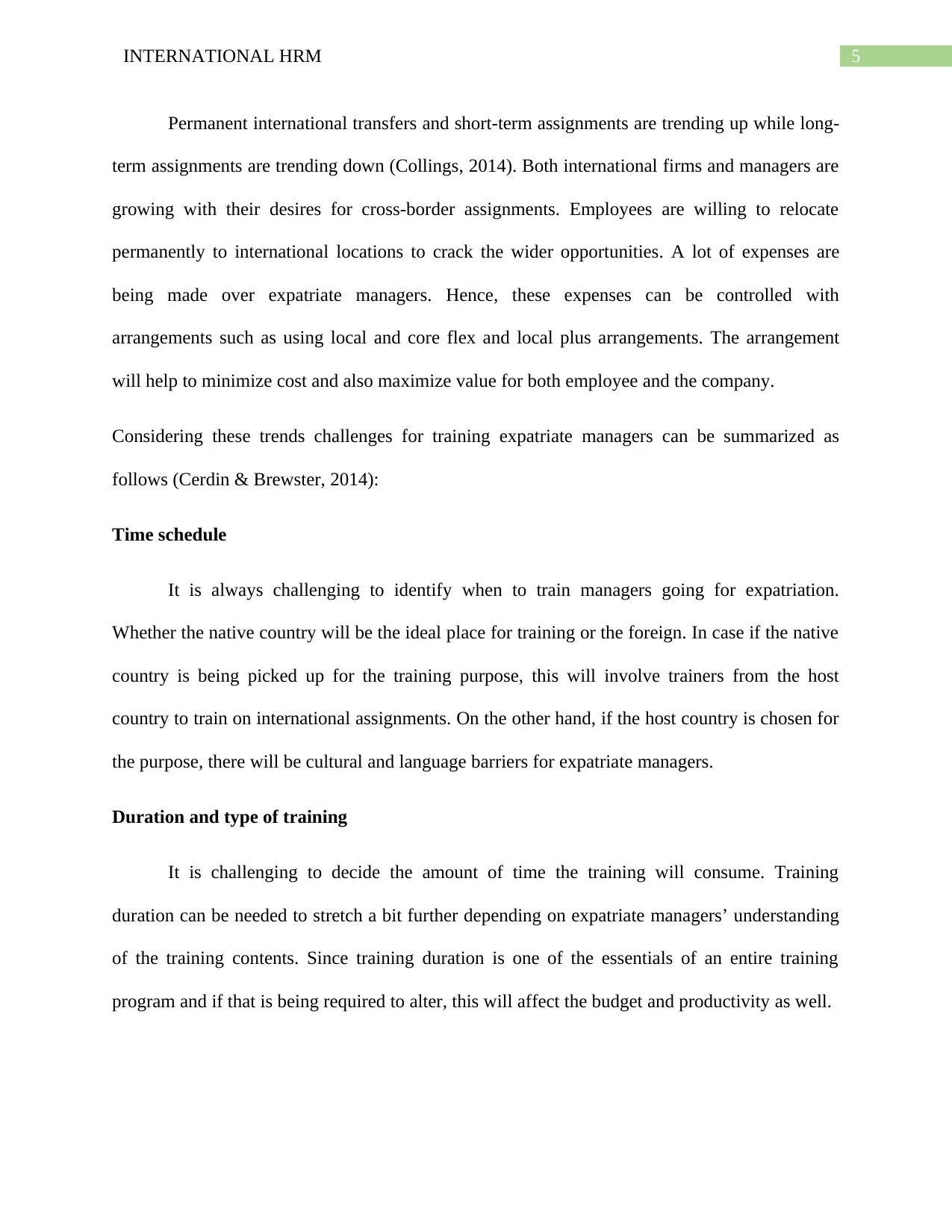
5INTERNATIONAL HRM
Permanent international transfers and short-term assignments are trending up while long-
term assignments are trending down (Collings, 2014). Both international firms and managers are
growing with their desires for cross-border assignments. Employees are willing to relocate
permanently to international locations to crack the wider opportunities. A lot of expenses are
being made over expatriate managers. Hence, these expenses can be controlled with
arrangements such as using local and core flex and local plus arrangements. The arrangement
will help to minimize cost and also maximize value for both employee and the company.
Considering these trends challenges for training expatriate managers can be summarized as
follows (Cerdin & Brewster, 2014):
Time schedule
It is always challenging to identify when to train managers going for expatriation.
Whether the native country will be the ideal place for training or the foreign. In case if the native
country is being picked up for the training purpose, this will involve trainers from the host
country to train on international assignments. On the other hand, if the host country is chosen for
the purpose, there will be cultural and language barriers for expatriate managers.
Duration and type of training
It is challenging to decide the amount of time the training will consume. Training
duration can be needed to stretch a bit further depending on expatriate managers’ understanding
of the training contents. Since training duration is one of the essentials of an entire training
program and if that is being required to alter, this will affect the budget and productivity as well.
Permanent international transfers and short-term assignments are trending up while long-
term assignments are trending down (Collings, 2014). Both international firms and managers are
growing with their desires for cross-border assignments. Employees are willing to relocate
permanently to international locations to crack the wider opportunities. A lot of expenses are
being made over expatriate managers. Hence, these expenses can be controlled with
arrangements such as using local and core flex and local plus arrangements. The arrangement
will help to minimize cost and also maximize value for both employee and the company.
Considering these trends challenges for training expatriate managers can be summarized as
follows (Cerdin & Brewster, 2014):
Time schedule
It is always challenging to identify when to train managers going for expatriation.
Whether the native country will be the ideal place for training or the foreign. In case if the native
country is being picked up for the training purpose, this will involve trainers from the host
country to train on international assignments. On the other hand, if the host country is chosen for
the purpose, there will be cultural and language barriers for expatriate managers.
Duration and type of training
It is challenging to decide the amount of time the training will consume. Training
duration can be needed to stretch a bit further depending on expatriate managers’ understanding
of the training contents. Since training duration is one of the essentials of an entire training
program and if that is being required to alter, this will affect the budget and productivity as well.
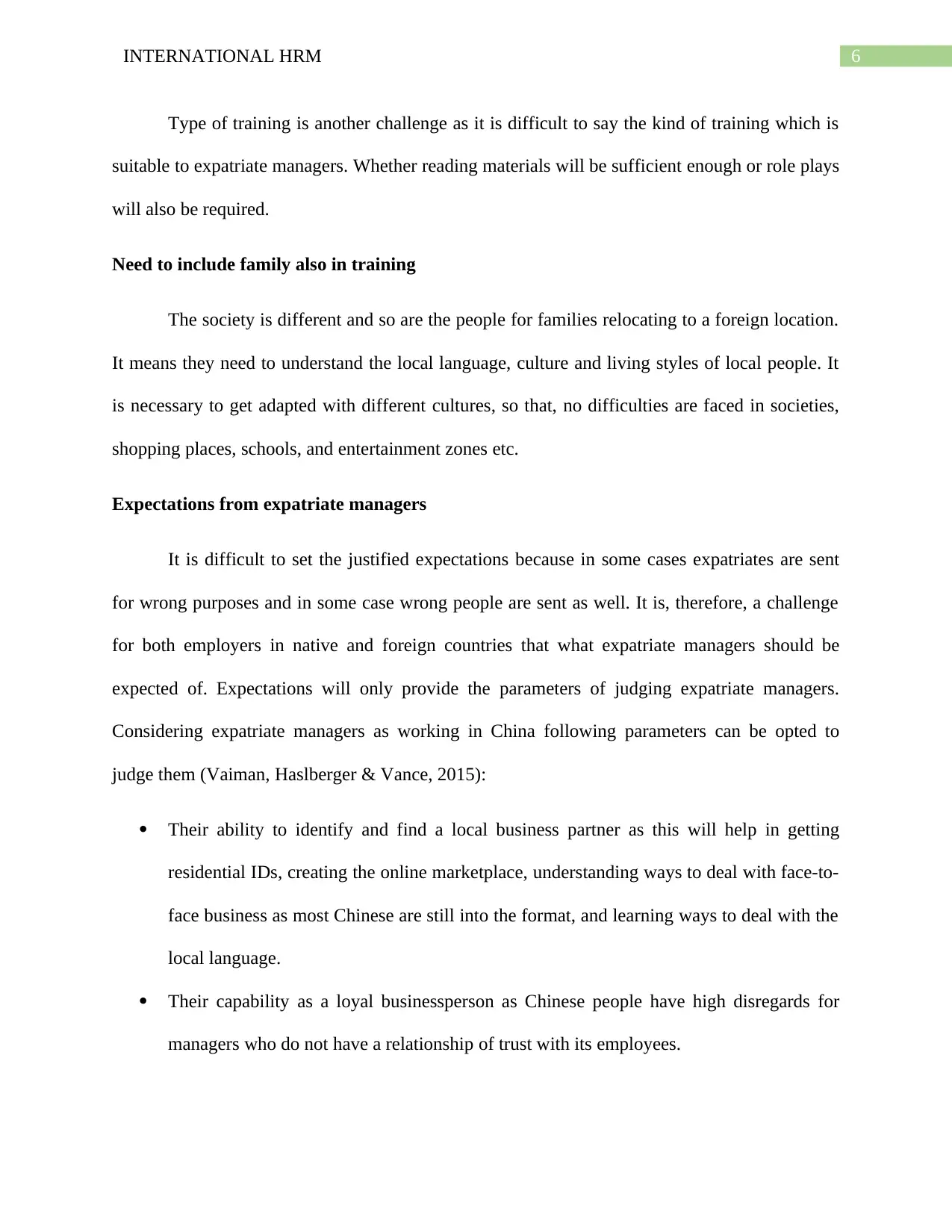
6INTERNATIONAL HRM
Type of training is another challenge as it is difficult to say the kind of training which is
suitable to expatriate managers. Whether reading materials will be sufficient enough or role plays
will also be required.
Need to include family also in training
The society is different and so are the people for families relocating to a foreign location.
It means they need to understand the local language, culture and living styles of local people. It
is necessary to get adapted with different cultures, so that, no difficulties are faced in societies,
shopping places, schools, and entertainment zones etc.
Expectations from expatriate managers
It is difficult to set the justified expectations because in some cases expatriates are sent
for wrong purposes and in some case wrong people are sent as well. It is, therefore, a challenge
for both employers in native and foreign countries that what expatriate managers should be
expected of. Expectations will only provide the parameters of judging expatriate managers.
Considering expatriate managers as working in China following parameters can be opted to
judge them (Vaiman, Haslberger & Vance, 2015):
Their ability to identify and find a local business partner as this will help in getting
residential IDs, creating the online marketplace, understanding ways to deal with face-to-
face business as most Chinese are still into the format, and learning ways to deal with the
local language.
Their capability as a loyal businessperson as Chinese people have high disregards for
managers who do not have a relationship of trust with its employees.
Type of training is another challenge as it is difficult to say the kind of training which is
suitable to expatriate managers. Whether reading materials will be sufficient enough or role plays
will also be required.
Need to include family also in training
The society is different and so are the people for families relocating to a foreign location.
It means they need to understand the local language, culture and living styles of local people. It
is necessary to get adapted with different cultures, so that, no difficulties are faced in societies,
shopping places, schools, and entertainment zones etc.
Expectations from expatriate managers
It is difficult to set the justified expectations because in some cases expatriates are sent
for wrong purposes and in some case wrong people are sent as well. It is, therefore, a challenge
for both employers in native and foreign countries that what expatriate managers should be
expected of. Expectations will only provide the parameters of judging expatriate managers.
Considering expatriate managers as working in China following parameters can be opted to
judge them (Vaiman, Haslberger & Vance, 2015):
Their ability to identify and find a local business partner as this will help in getting
residential IDs, creating the online marketplace, understanding ways to deal with face-to-
face business as most Chinese are still into the format, and learning ways to deal with the
local language.
Their capability as a loyal businessperson as Chinese people have high disregards for
managers who do not have a relationship of trust with its employees.
Paraphrase This Document
Need a fresh take? Get an instant paraphrase of this document with our AI Paraphraser
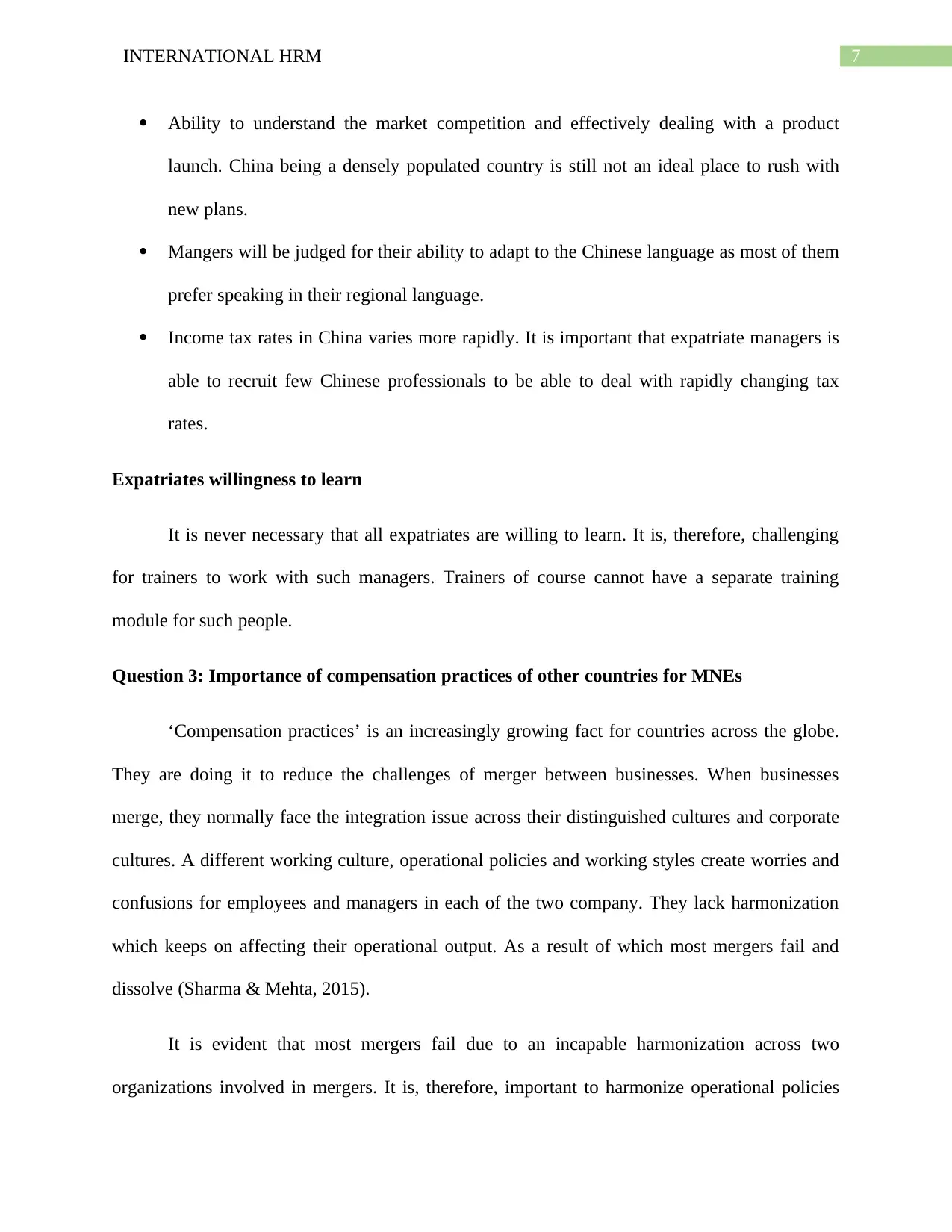
7INTERNATIONAL HRM
Ability to understand the market competition and effectively dealing with a product
launch. China being a densely populated country is still not an ideal place to rush with
new plans.
Mangers will be judged for their ability to adapt to the Chinese language as most of them
prefer speaking in their regional language.
Income tax rates in China varies more rapidly. It is important that expatriate managers is
able to recruit few Chinese professionals to be able to deal with rapidly changing tax
rates.
Expatriates willingness to learn
It is never necessary that all expatriates are willing to learn. It is, therefore, challenging
for trainers to work with such managers. Trainers of course cannot have a separate training
module for such people.
Question 3: Importance of compensation practices of other countries for MNEs
‘Compensation practices’ is an increasingly growing fact for countries across the globe.
They are doing it to reduce the challenges of merger between businesses. When businesses
merge, they normally face the integration issue across their distinguished cultures and corporate
cultures. A different working culture, operational policies and working styles create worries and
confusions for employees and managers in each of the two company. They lack harmonization
which keeps on affecting their operational output. As a result of which most mergers fail and
dissolve (Sharma & Mehta, 2015).
It is evident that most mergers fail due to an incapable harmonization across two
organizations involved in mergers. It is, therefore, important to harmonize operational policies
Ability to understand the market competition and effectively dealing with a product
launch. China being a densely populated country is still not an ideal place to rush with
new plans.
Mangers will be judged for their ability to adapt to the Chinese language as most of them
prefer speaking in their regional language.
Income tax rates in China varies more rapidly. It is important that expatriate managers is
able to recruit few Chinese professionals to be able to deal with rapidly changing tax
rates.
Expatriates willingness to learn
It is never necessary that all expatriates are willing to learn. It is, therefore, challenging
for trainers to work with such managers. Trainers of course cannot have a separate training
module for such people.
Question 3: Importance of compensation practices of other countries for MNEs
‘Compensation practices’ is an increasingly growing fact for countries across the globe.
They are doing it to reduce the challenges of merger between businesses. When businesses
merge, they normally face the integration issue across their distinguished cultures and corporate
cultures. A different working culture, operational policies and working styles create worries and
confusions for employees and managers in each of the two company. They lack harmonization
which keeps on affecting their operational output. As a result of which most mergers fail and
dissolve (Sharma & Mehta, 2015).
It is evident that most mergers fail due to an incapable harmonization across two
organizations involved in mergers. It is, therefore, important to harmonize operational policies
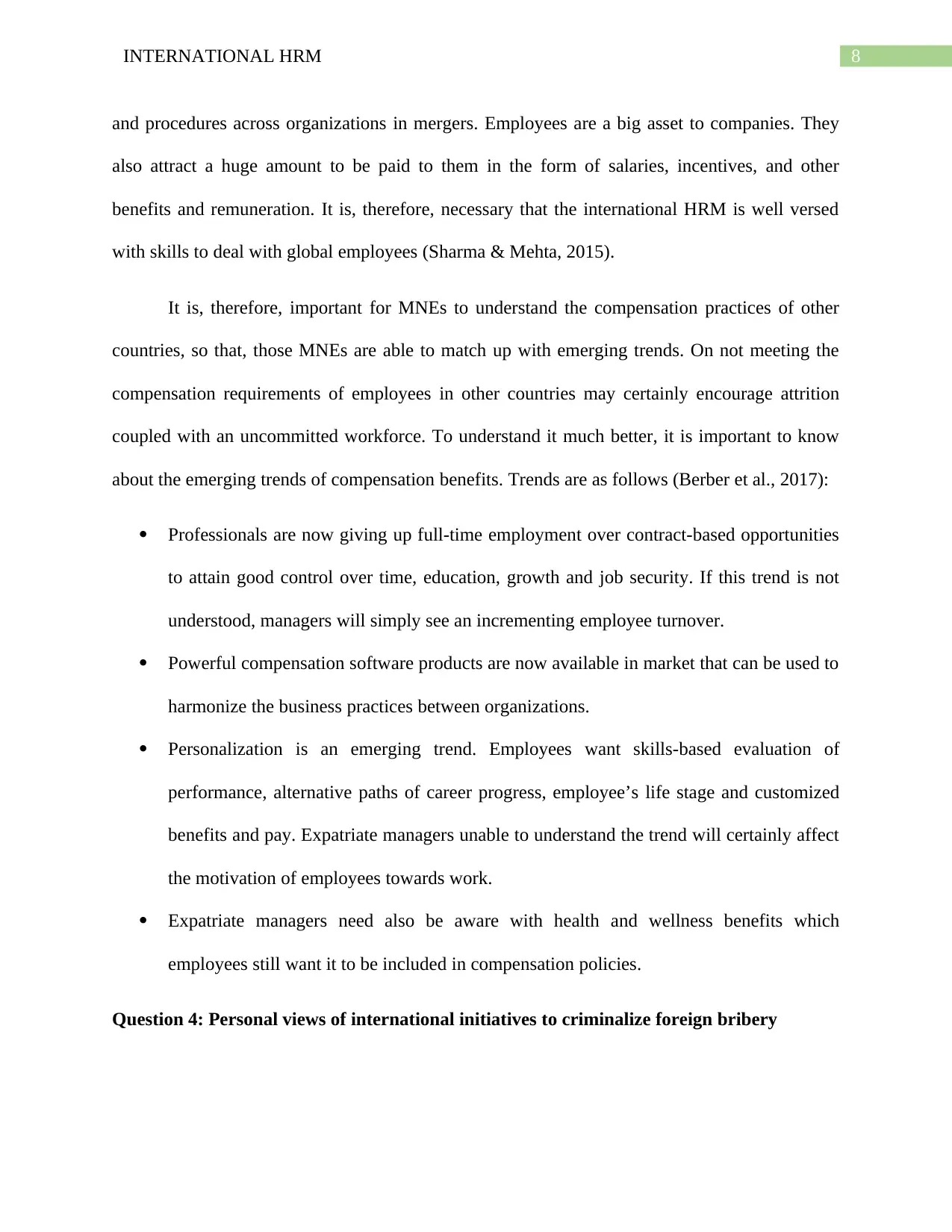
8INTERNATIONAL HRM
and procedures across organizations in mergers. Employees are a big asset to companies. They
also attract a huge amount to be paid to them in the form of salaries, incentives, and other
benefits and remuneration. It is, therefore, necessary that the international HRM is well versed
with skills to deal with global employees (Sharma & Mehta, 2015).
It is, therefore, important for MNEs to understand the compensation practices of other
countries, so that, those MNEs are able to match up with emerging trends. On not meeting the
compensation requirements of employees in other countries may certainly encourage attrition
coupled with an uncommitted workforce. To understand it much better, it is important to know
about the emerging trends of compensation benefits. Trends are as follows (Berber et al., 2017):
Professionals are now giving up full-time employment over contract-based opportunities
to attain good control over time, education, growth and job security. If this trend is not
understood, managers will simply see an incrementing employee turnover.
Powerful compensation software products are now available in market that can be used to
harmonize the business practices between organizations.
Personalization is an emerging trend. Employees want skills-based evaluation of
performance, alternative paths of career progress, employee’s life stage and customized
benefits and pay. Expatriate managers unable to understand the trend will certainly affect
the motivation of employees towards work.
Expatriate managers need also be aware with health and wellness benefits which
employees still want it to be included in compensation policies.
Question 4: Personal views of international initiatives to criminalize foreign bribery
and procedures across organizations in mergers. Employees are a big asset to companies. They
also attract a huge amount to be paid to them in the form of salaries, incentives, and other
benefits and remuneration. It is, therefore, necessary that the international HRM is well versed
with skills to deal with global employees (Sharma & Mehta, 2015).
It is, therefore, important for MNEs to understand the compensation practices of other
countries, so that, those MNEs are able to match up with emerging trends. On not meeting the
compensation requirements of employees in other countries may certainly encourage attrition
coupled with an uncommitted workforce. To understand it much better, it is important to know
about the emerging trends of compensation benefits. Trends are as follows (Berber et al., 2017):
Professionals are now giving up full-time employment over contract-based opportunities
to attain good control over time, education, growth and job security. If this trend is not
understood, managers will simply see an incrementing employee turnover.
Powerful compensation software products are now available in market that can be used to
harmonize the business practices between organizations.
Personalization is an emerging trend. Employees want skills-based evaluation of
performance, alternative paths of career progress, employee’s life stage and customized
benefits and pay. Expatriate managers unable to understand the trend will certainly affect
the motivation of employees towards work.
Expatriate managers need also be aware with health and wellness benefits which
employees still want it to be included in compensation policies.
Question 4: Personal views of international initiatives to criminalize foreign bribery
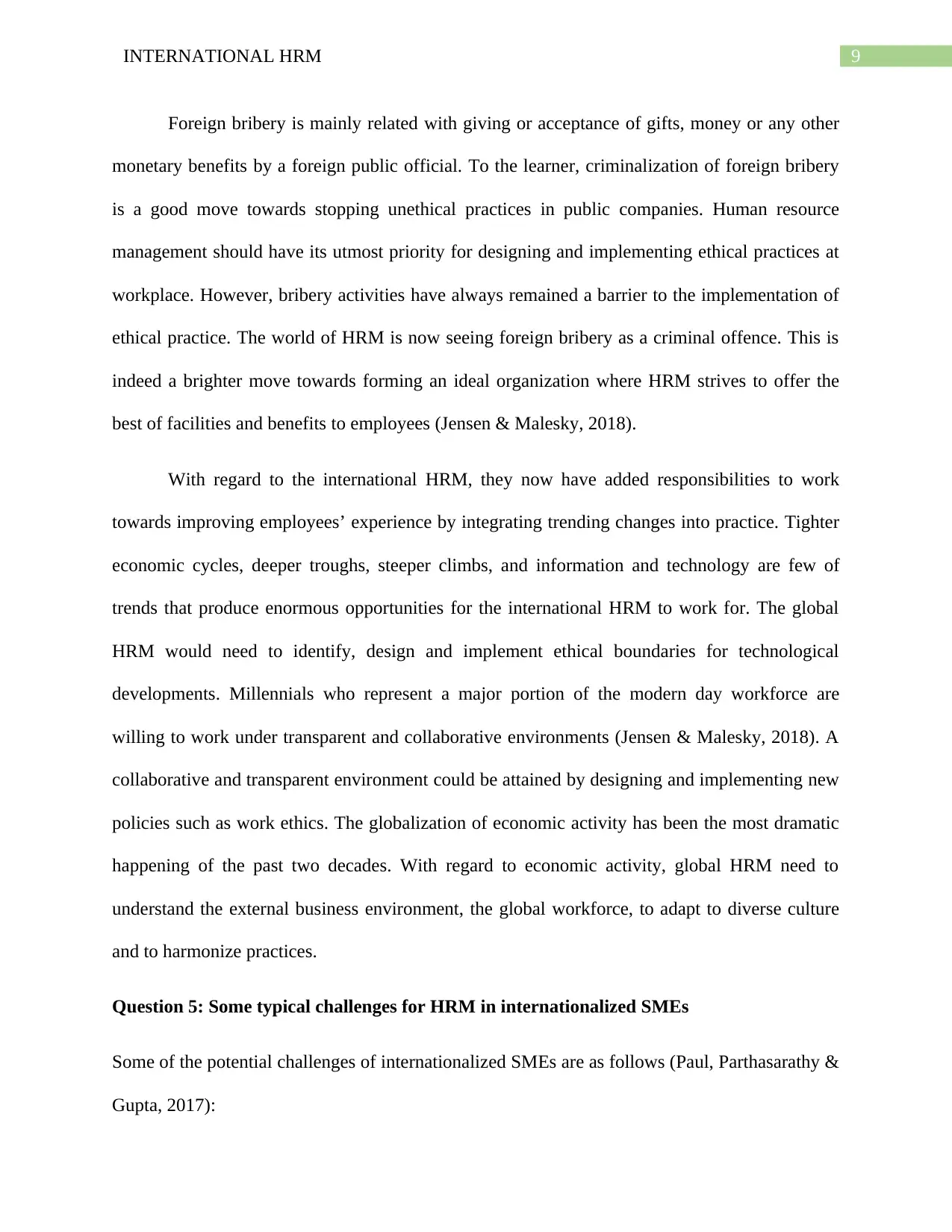
9INTERNATIONAL HRM
Foreign bribery is mainly related with giving or acceptance of gifts, money or any other
monetary benefits by a foreign public official. To the learner, criminalization of foreign bribery
is a good move towards stopping unethical practices in public companies. Human resource
management should have its utmost priority for designing and implementing ethical practices at
workplace. However, bribery activities have always remained a barrier to the implementation of
ethical practice. The world of HRM is now seeing foreign bribery as a criminal offence. This is
indeed a brighter move towards forming an ideal organization where HRM strives to offer the
best of facilities and benefits to employees (Jensen & Malesky, 2018).
With regard to the international HRM, they now have added responsibilities to work
towards improving employees’ experience by integrating trending changes into practice. Tighter
economic cycles, deeper troughs, steeper climbs, and information and technology are few of
trends that produce enormous opportunities for the international HRM to work for. The global
HRM would need to identify, design and implement ethical boundaries for technological
developments. Millennials who represent a major portion of the modern day workforce are
willing to work under transparent and collaborative environments (Jensen & Malesky, 2018). A
collaborative and transparent environment could be attained by designing and implementing new
policies such as work ethics. The globalization of economic activity has been the most dramatic
happening of the past two decades. With regard to economic activity, global HRM need to
understand the external business environment, the global workforce, to adapt to diverse culture
and to harmonize practices.
Question 5: Some typical challenges for HRM in internationalized SMEs
Some of the potential challenges of internationalized SMEs are as follows (Paul, Parthasarathy &
Gupta, 2017):
Foreign bribery is mainly related with giving or acceptance of gifts, money or any other
monetary benefits by a foreign public official. To the learner, criminalization of foreign bribery
is a good move towards stopping unethical practices in public companies. Human resource
management should have its utmost priority for designing and implementing ethical practices at
workplace. However, bribery activities have always remained a barrier to the implementation of
ethical practice. The world of HRM is now seeing foreign bribery as a criminal offence. This is
indeed a brighter move towards forming an ideal organization where HRM strives to offer the
best of facilities and benefits to employees (Jensen & Malesky, 2018).
With regard to the international HRM, they now have added responsibilities to work
towards improving employees’ experience by integrating trending changes into practice. Tighter
economic cycles, deeper troughs, steeper climbs, and information and technology are few of
trends that produce enormous opportunities for the international HRM to work for. The global
HRM would need to identify, design and implement ethical boundaries for technological
developments. Millennials who represent a major portion of the modern day workforce are
willing to work under transparent and collaborative environments (Jensen & Malesky, 2018). A
collaborative and transparent environment could be attained by designing and implementing new
policies such as work ethics. The globalization of economic activity has been the most dramatic
happening of the past two decades. With regard to economic activity, global HRM need to
understand the external business environment, the global workforce, to adapt to diverse culture
and to harmonize practices.
Question 5: Some typical challenges for HRM in internationalized SMEs
Some of the potential challenges of internationalized SMEs are as follows (Paul, Parthasarathy &
Gupta, 2017):
Secure Best Marks with AI Grader
Need help grading? Try our AI Grader for instant feedback on your assignments.
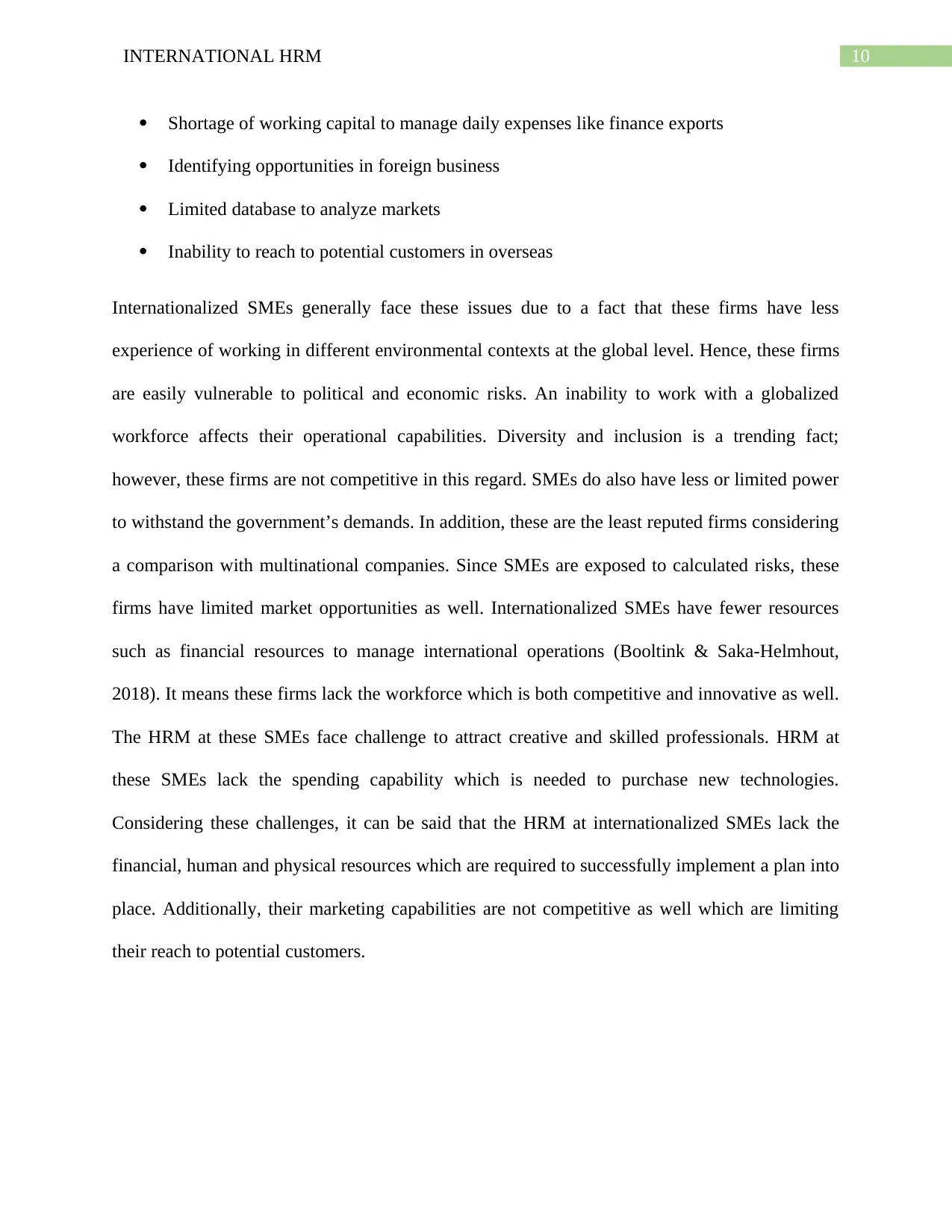
10INTERNATIONAL HRM
Shortage of working capital to manage daily expenses like finance exports
Identifying opportunities in foreign business
Limited database to analyze markets
Inability to reach to potential customers in overseas
Internationalized SMEs generally face these issues due to a fact that these firms have less
experience of working in different environmental contexts at the global level. Hence, these firms
are easily vulnerable to political and economic risks. An inability to work with a globalized
workforce affects their operational capabilities. Diversity and inclusion is a trending fact;
however, these firms are not competitive in this regard. SMEs do also have less or limited power
to withstand the government’s demands. In addition, these are the least reputed firms considering
a comparison with multinational companies. Since SMEs are exposed to calculated risks, these
firms have limited market opportunities as well. Internationalized SMEs have fewer resources
such as financial resources to manage international operations (Booltink & Saka-Helmhout,
2018). It means these firms lack the workforce which is both competitive and innovative as well.
The HRM at these SMEs face challenge to attract creative and skilled professionals. HRM at
these SMEs lack the spending capability which is needed to purchase new technologies.
Considering these challenges, it can be said that the HRM at internationalized SMEs lack the
financial, human and physical resources which are required to successfully implement a plan into
place. Additionally, their marketing capabilities are not competitive as well which are limiting
their reach to potential customers.
Shortage of working capital to manage daily expenses like finance exports
Identifying opportunities in foreign business
Limited database to analyze markets
Inability to reach to potential customers in overseas
Internationalized SMEs generally face these issues due to a fact that these firms have less
experience of working in different environmental contexts at the global level. Hence, these firms
are easily vulnerable to political and economic risks. An inability to work with a globalized
workforce affects their operational capabilities. Diversity and inclusion is a trending fact;
however, these firms are not competitive in this regard. SMEs do also have less or limited power
to withstand the government’s demands. In addition, these are the least reputed firms considering
a comparison with multinational companies. Since SMEs are exposed to calculated risks, these
firms have limited market opportunities as well. Internationalized SMEs have fewer resources
such as financial resources to manage international operations (Booltink & Saka-Helmhout,
2018). It means these firms lack the workforce which is both competitive and innovative as well.
The HRM at these SMEs face challenge to attract creative and skilled professionals. HRM at
these SMEs lack the spending capability which is needed to purchase new technologies.
Considering these challenges, it can be said that the HRM at internationalized SMEs lack the
financial, human and physical resources which are required to successfully implement a plan into
place. Additionally, their marketing capabilities are not competitive as well which are limiting
their reach to potential customers.
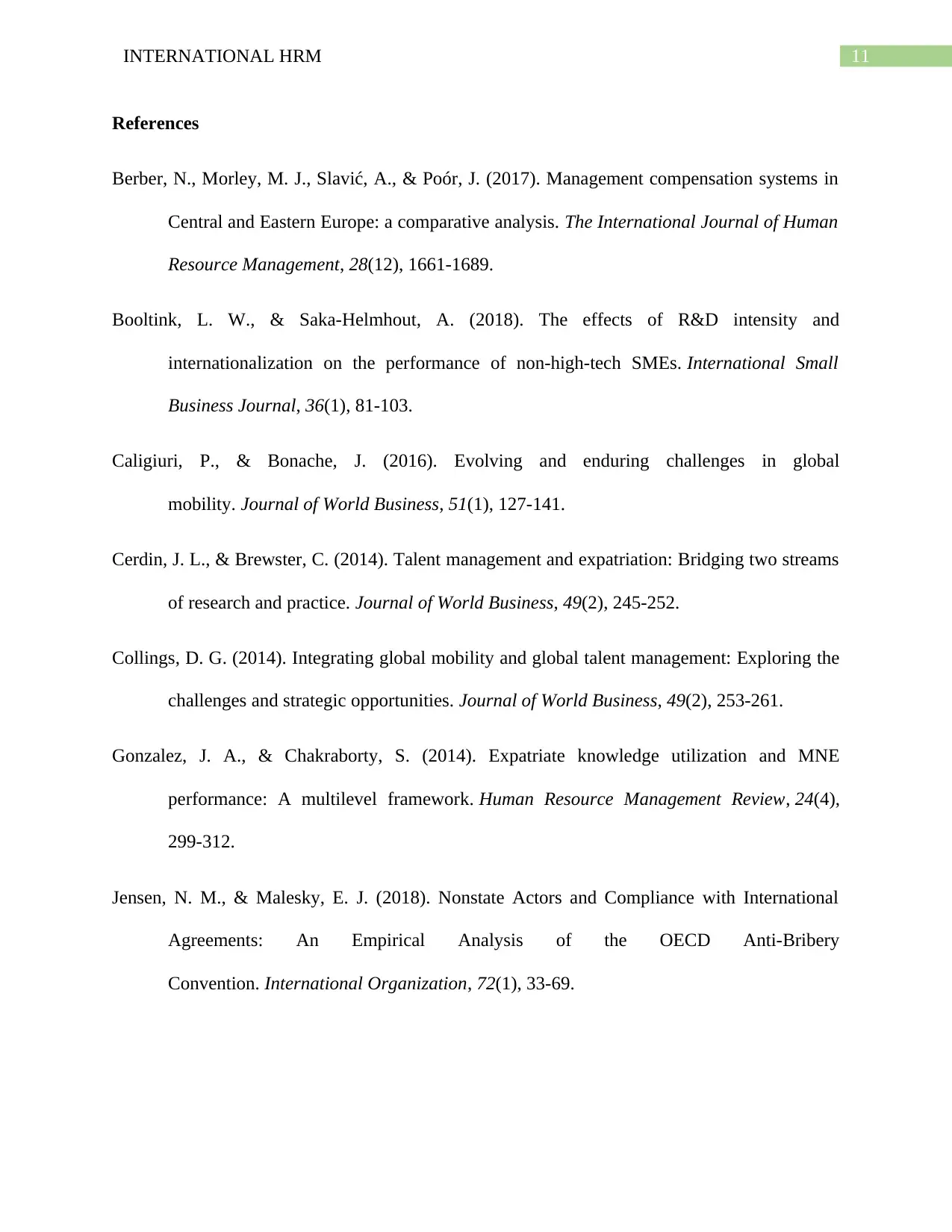
11INTERNATIONAL HRM
References
Berber, N., Morley, M. J., Slavić, A., & Poór, J. (2017). Management compensation systems in
Central and Eastern Europe: a comparative analysis. The International Journal of Human
Resource Management, 28(12), 1661-1689.
Booltink, L. W., & Saka-Helmhout, A. (2018). The effects of R&D intensity and
internationalization on the performance of non-high-tech SMEs. International Small
Business Journal, 36(1), 81-103.
Caligiuri, P., & Bonache, J. (2016). Evolving and enduring challenges in global
mobility. Journal of World Business, 51(1), 127-141.
Cerdin, J. L., & Brewster, C. (2014). Talent management and expatriation: Bridging two streams
of research and practice. Journal of World Business, 49(2), 245-252.
Collings, D. G. (2014). Integrating global mobility and global talent management: Exploring the
challenges and strategic opportunities. Journal of World Business, 49(2), 253-261.
Gonzalez, J. A., & Chakraborty, S. (2014). Expatriate knowledge utilization and MNE
performance: A multilevel framework. Human Resource Management Review, 24(4),
299-312.
Jensen, N. M., & Malesky, E. J. (2018). Nonstate Actors and Compliance with International
Agreements: An Empirical Analysis of the OECD Anti-Bribery
Convention. International Organization, 72(1), 33-69.
References
Berber, N., Morley, M. J., Slavić, A., & Poór, J. (2017). Management compensation systems in
Central and Eastern Europe: a comparative analysis. The International Journal of Human
Resource Management, 28(12), 1661-1689.
Booltink, L. W., & Saka-Helmhout, A. (2018). The effects of R&D intensity and
internationalization on the performance of non-high-tech SMEs. International Small
Business Journal, 36(1), 81-103.
Caligiuri, P., & Bonache, J. (2016). Evolving and enduring challenges in global
mobility. Journal of World Business, 51(1), 127-141.
Cerdin, J. L., & Brewster, C. (2014). Talent management and expatriation: Bridging two streams
of research and practice. Journal of World Business, 49(2), 245-252.
Collings, D. G. (2014). Integrating global mobility and global talent management: Exploring the
challenges and strategic opportunities. Journal of World Business, 49(2), 253-261.
Gonzalez, J. A., & Chakraborty, S. (2014). Expatriate knowledge utilization and MNE
performance: A multilevel framework. Human Resource Management Review, 24(4),
299-312.
Jensen, N. M., & Malesky, E. J. (2018). Nonstate Actors and Compliance with International
Agreements: An Empirical Analysis of the OECD Anti-Bribery
Convention. International Organization, 72(1), 33-69.
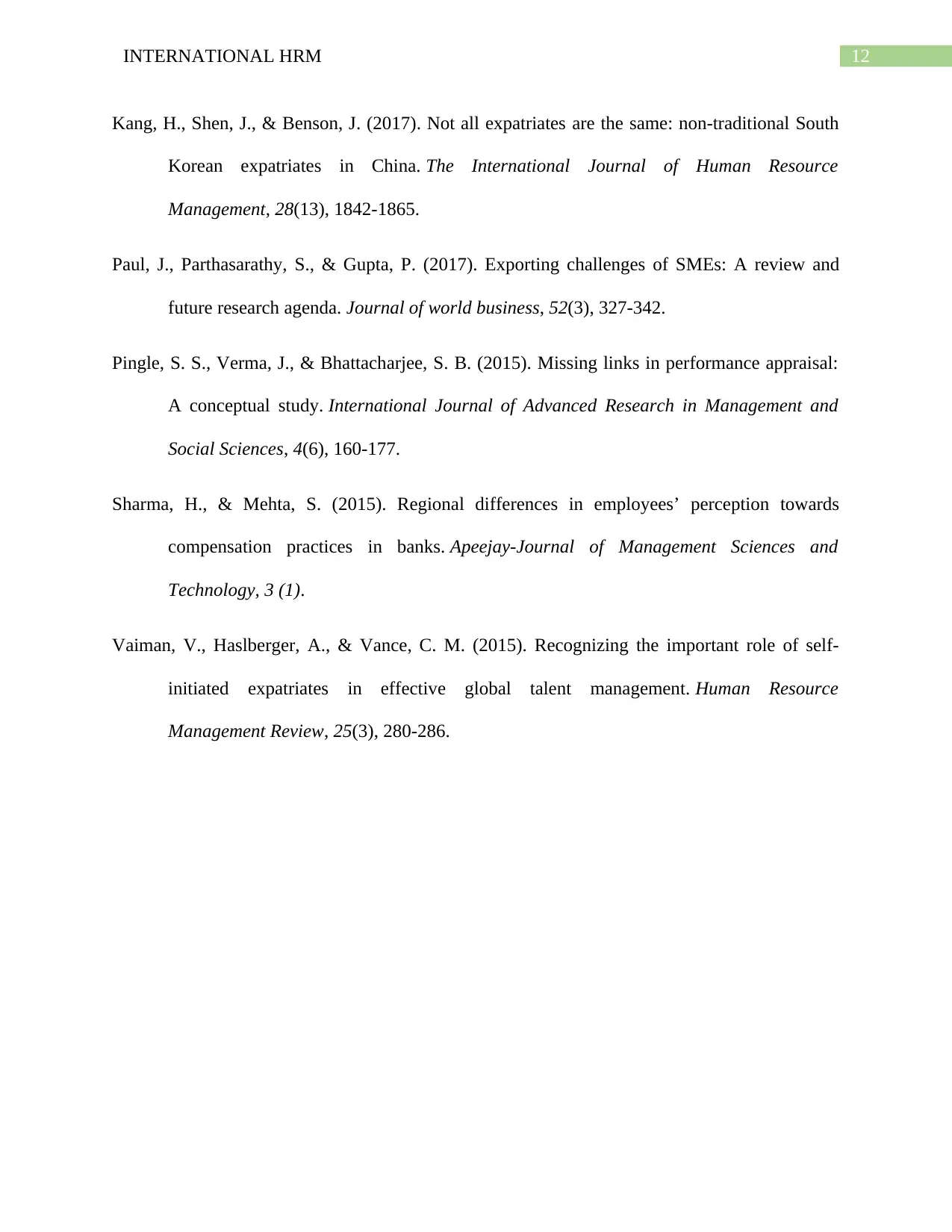
12INTERNATIONAL HRM
Kang, H., Shen, J., & Benson, J. (2017). Not all expatriates are the same: non-traditional South
Korean expatriates in China. The International Journal of Human Resource
Management, 28(13), 1842-1865.
Paul, J., Parthasarathy, S., & Gupta, P. (2017). Exporting challenges of SMEs: A review and
future research agenda. Journal of world business, 52(3), 327-342.
Pingle, S. S., Verma, J., & Bhattacharjee, S. B. (2015). Missing links in performance appraisal:
A conceptual study. International Journal of Advanced Research in Management and
Social Sciences, 4(6), 160-177.
Sharma, H., & Mehta, S. (2015). Regional differences in employees’ perception towards
compensation practices in banks. Apeejay-Journal of Management Sciences and
Technology, 3 (1).
Vaiman, V., Haslberger, A., & Vance, C. M. (2015). Recognizing the important role of self-
initiated expatriates in effective global talent management. Human Resource
Management Review, 25(3), 280-286.
Kang, H., Shen, J., & Benson, J. (2017). Not all expatriates are the same: non-traditional South
Korean expatriates in China. The International Journal of Human Resource
Management, 28(13), 1842-1865.
Paul, J., Parthasarathy, S., & Gupta, P. (2017). Exporting challenges of SMEs: A review and
future research agenda. Journal of world business, 52(3), 327-342.
Pingle, S. S., Verma, J., & Bhattacharjee, S. B. (2015). Missing links in performance appraisal:
A conceptual study. International Journal of Advanced Research in Management and
Social Sciences, 4(6), 160-177.
Sharma, H., & Mehta, S. (2015). Regional differences in employees’ perception towards
compensation practices in banks. Apeejay-Journal of Management Sciences and
Technology, 3 (1).
Vaiman, V., Haslberger, A., & Vance, C. M. (2015). Recognizing the important role of self-
initiated expatriates in effective global talent management. Human Resource
Management Review, 25(3), 280-286.
1 out of 13
Related Documents
Your All-in-One AI-Powered Toolkit for Academic Success.
+13062052269
info@desklib.com
Available 24*7 on WhatsApp / Email
![[object Object]](/_next/static/media/star-bottom.7253800d.svg)
Unlock your academic potential
© 2024 | Zucol Services PVT LTD | All rights reserved.


